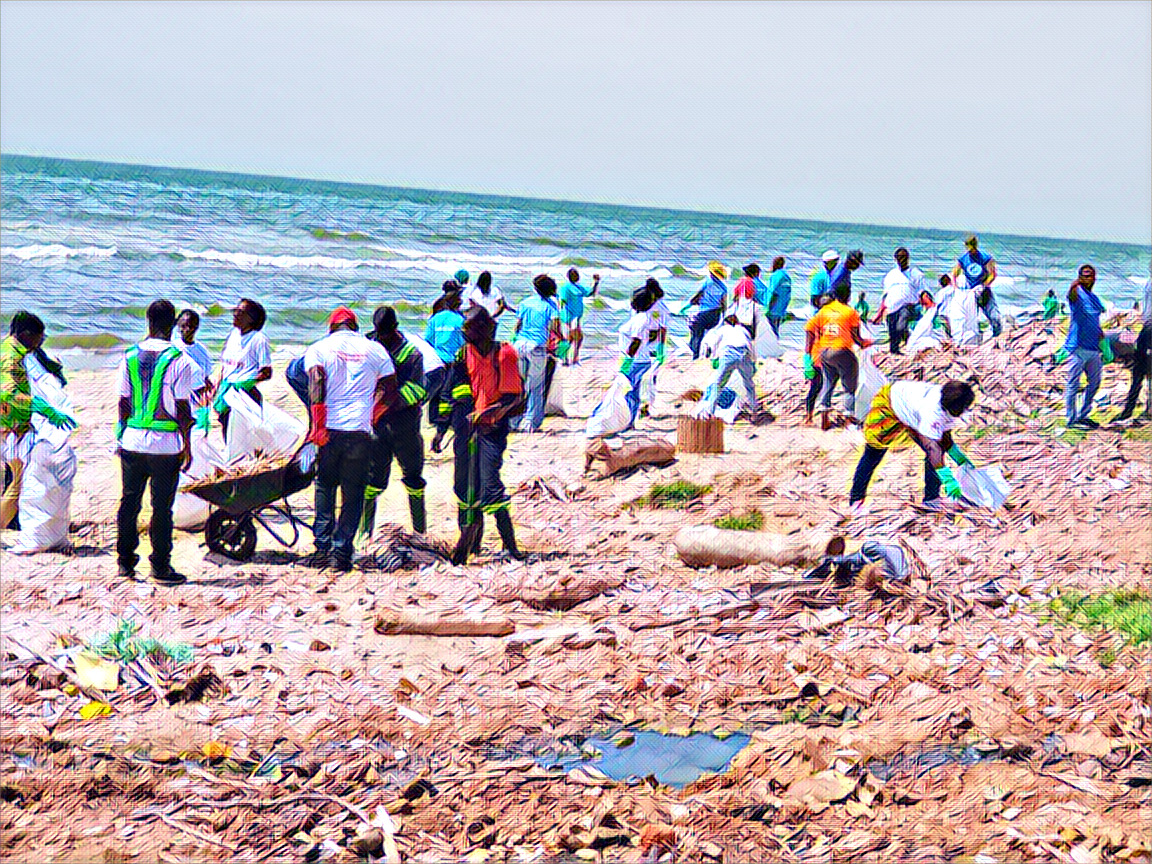A group of companies that own and operate a power plant in Ghana have joined forces to tackle the problem of plastic and waste pollution on the beaches near their facility. The project, called KIPP Clean, was launched on the nation’s Founder’s Day with a clean-up exercise at Sega Beach in Kpone, Greater Accra Region.
The project is supported by Cenpower Generation Ltd, owners of the Kpone Independent Power Plant (KIPP), and five other environmentally conscious organizations: the Kpone Katamanso Municipal Assembly, the Tema Tank Farm Ltd, the Sunon Asogli Power (Ghana) Ltd, Ecostar Environmental Services Ltd, and Cenpower Operations and Services Ltd.
About 150 volunteers from the partner organizations participated in the clean-up exercise, wearing personal protective gear and using cleaning tools and equipment. The waste collected during the event was managed by a waste management specialist.
The CEO and board member of Cenpower, Theophilus Sackey, said the exercise showed the company’s commitment to preserving the planet and its ecosystems in the face of climate change threats. He thanked the participating organizations and said they recognised the importance of protecting the marine environment for the well-being of all living creatures.
The project aims to raise awareness of the environmental hazards posed by plastic and waste pollution, especially to marine life. It also seeks to strengthen the relationships among the partner organizations and the community. The project is part of the company’s corporate social responsibility.
Cenpower is a major electricity supplier in Ghana, producing 350 megawatts of power, which accounts for about 10 per cent of the country’s total power generation capacity and 15 per cent of its available thermal power generation capacity. It is one of the largest private independent power producers in Ghana.
Plastic and waste pollution is a global challenge that affects millions of people and animals. According to a report by the World Bank, Ghana generates about 1.47 million tons of plastic waste annually, of which only 2 per cent is recycled. The rest ends up in landfills, dumpsites, or water bodies, causing environmental and health problems. The KIPP Clean project is an example of how businesses can take action to address this issue and contribute to a cleaner and greener future for Ghana and the world.
Source: Graphic Online





5 comments
Hier gibt es 12 Video Poker Maschinen mit besonders hohen Einsatzlimits für spannendes Spiel auf der Terrasse.
Im Casino Café de Paris gibt es auch elektronisches Roulette mit Einsätzen schon ab 25 Cent.
Ganz im Stil von Las Vegas warten hier knapp 500 moderne Spielautomaten auf Zocker.
Das Monaco Casino Café de Paris lockt vor allem die Fans der Slot Machines.
Das Café de La Rotonde im Atrium dagegen lädt jedermann zur Entspannung
ein.
Unter Friedrich Barbarossa und Heinrich VI wurde Monaco
schließlich unter die Herrschaft der Republik Genua gestellt.
Jahrhundert wiederum von barbarischen Völkern verdrängt.
Dazu kommt das unvorhersehbare Wetter zu dieser Zeit des Jahres.
Das Monte-Carlo Casino ist auch nicht das älteste Casino der Welt, da es ältere
Ziele in Deutschland und unter den italienischen Casinos gibt.
Das Monte-Carlo Casino ist nicht das größte Casino der Welt, nicht
annähernd. Die Einrichtung ist definitiv eine der wichtigsten in der Geschichte
des Glücksspiels. Es gibt jedoch auch viele interessante Fakten über das Casino de Monte-Carlo, von denen selbst die größten Glücksspiel-Fans
vielleicht noch nie gehört haben.
References:
https://online-spielhallen.de/hit-spin-casino-bewertung-ein-detaillierter-blick-auf-das-spielerlebnis/
Therefore, he reached his 30th birthday before the swearing-in ceremony for incoming senators in January 1973.
Similarly, the president may make congressional-executive agreements
with the approval of a simple majority in each House of Congress, rather
than a two-thirds majority in the Senate. Problems with repeated vacant seats due to the
inability of a legislature to elect senators, intrastate political struggles, bribery and intimidation gradually
led to a growing movement to amend the Constitution to allow for the
direct election of senators. If no candidate receives a majority
of electors for vice president, the duty falls to the Senate to elect one of
the top two recipients of electors to that office.
Supporters generally consider the filibuster to be an important protection for the minority views and a check
against the unfettered single-party rule when the same party
holds the Presidency and a majority in both the House and Senate.
Ways to reform the filibuster mainly include restoring a
talking filibuster or adjusting the numbers of votes needed in varying ways.
Following this, in 1841, Senator John Calhoun rallied a number of Southern senators to take
the floor, one after another for days, in opposition of the national bank.
References:
https://blackcoin.co/top-online-casinos-in-australia-your-2025-guide/
PayPal online casinos are generally not licensed in Australia as domestic laws
do not permit their operations locally. So, it’s no surprise that
the best online casino that accepts PayPal offers a fully optimised mobile platform for seamless gameplay, accessibility and ease.
Only the online casinos that rank highly across all of these metrics make it
to our list.
Having registered on an online gambling website, a future player creates his/her
personal user account. You can always find more Australian casino bonuses with us.
To get a no deposit bonus and start playing it is enough to go through a quick registration procedure, as well as confirm
it via email or phone number. A player cannot withdraw “free” money from the account
as long as the bonus is not fully wagered as per its wagering requirements.
After activating this bonus, there are other deposit offers that Uptown Pokies has reserved for
new punters. First-time players who use the “20FREE” promo code when creating new accounts at Ozwin Casino get a welcome reward.
References:
https://blackcoin.co/casino-mate-quick-overview/
online betting with paypal winnersbet
References:
hrzoom.ca
us online casinos that accept paypal
References:
sigorta.jobs